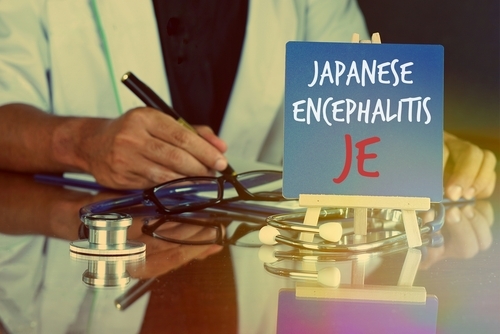Central experts reach Solan village to find origin of Japanese Encephalitis virus
UNI Jun 07, 2018
After detection of two 'positive cases' of Japanese Encephalitis (JE) in Solan and Shimla districts, teams of entomologists and central experts on Jue 6 visited the area to take stock of the situation.

The cases have been reported in this hilly state for the first time. Notably, JE is mosquito-borne infection of the brain caused by a virus and further posed threats to the life of the patient. Children from Siharadi and Sanwara villages of Dharampur area and Dhalli of Shimla area had earlier developed sign of minor fever with chest congestion and after initial treatment both the sufferers were referred to Indira Gandhi Medical College, Shimla where during the in-depth examination and blood tests, it was established that both the children were suffering from JE.
Though central Research Institute Kasauli was one of the major producers of JE vaccine but the production of the vaccine was suspended in 2013 after the CRI authorities had failed to meet out with the GMP norms in accordance with the World Health Organisation's guidelines and rules. The Central experts had earlier confirmed two cases of JE from Dharampur area of the district, this week.
Both children are under treatment in the Indira Gandhi Medical College Hospital, Shimla. A three-year-old boy from Dharampur is critical and on ventilator support. The other, one from Dharampur is also under intensive care. Seven Solan kids and one from Dhalli near Shimla were rushed to the IGMC, Shimla, with symptoms of viral infection, but five were discharged, last week.
Solan chief medical officer R K Daroch said three teams – one team of entomologists, second team from National Vector Borne Disease Control Programme and third team from National Communicable Diseases Center visited Siharadi and Sanwara and other villages of Dharmapur area to ascertain the cause of the spread of JE in the region.
The team members besides looking all other aspects also visits village ponds and other possible water reservoirs where mosquito could find suitable place for laying eggs. Team members also lifted the samples of water from several village in the region.
According to Health Ministry sources, the Principal Secretary (Health) was informed that a team from the National Centre for Disease Control and the National Vector-Borne Disease Control Programme will be sent to Himachal for detailed investigations into cause of the infection.
The Central team sent to Solan and Shimla will now determine whether JE infection in the state is indigenous or imported. The experts will also have to trace the virus host and its vector, the mosquito, in Solan for the infection to be notified as endemic. Mosquitoes get the infection by feeding on diseased domestic pigs and wild birds.
They then further transmit the JE virus to humans. State surveillance officer under the Integrated Disease Control Programme had spotted symptoms of febrile illness in seven children of Solan district and referred them to the IGMC, Shimla, for suspecting Nipah virus. Their samples were sent to the National Institute of Virology, Pune. Two of these instead tested positive for JE. This is the first time the state has seen cases of the JE virus, which kills 220 children under 15 throughout India every year. Himachal, the home state of Health Minister JP Nadda, is the 23rd state to be affected by the deadly JE virus now.
-
Exclusive Write-ups & Webinars by KOLs
-
Daily Quiz by specialty
-
Paid Market Research Surveys
-
Case discussions, News & Journals' summaries